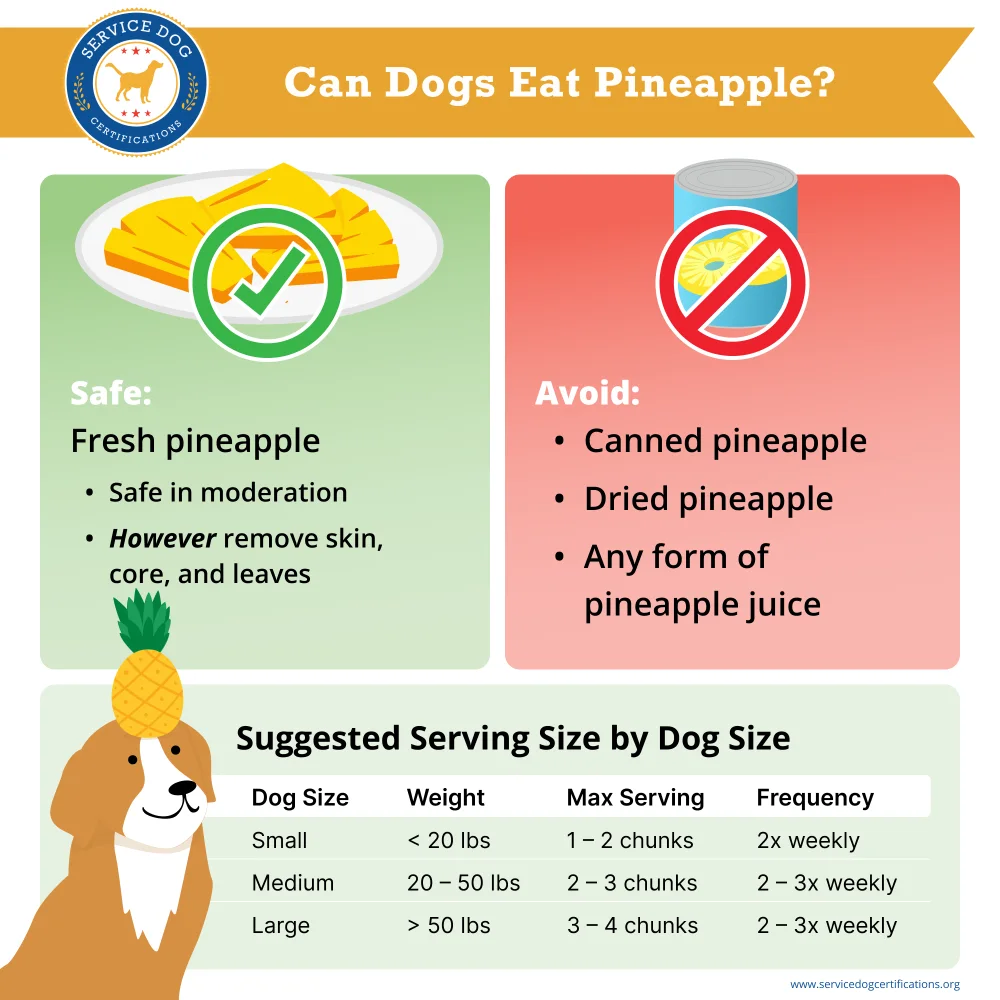Can Dogs Eat Pineapple?

Yes, dogs can safely eat fresh pineapple in moderation. This comprehensive guide combines scientific research with practical advice to help you safely share this tropical fruit with your canine.
Share this image on your site
Nutritional Benefits of Fresh Pineapple
Fresh pineapple packs a powerful nutritional punch that can benefit your dog’s health:
- Vitamins and Minerals: Rich in vitamin C, B6, folate, and minerals like manganese and potassium
- Hydration: High water content (around 87%) helps keep your dog hydrated
- Fiber: Contains dietary fiber that supports digestive health
- Antioxidants: Offers beneficial compounds that help fight inflammation
- Natural Enzymes: Contains bromelain, which can aid digestion
Types of Pineapple Compared
Comprehensive Comparison Chart
| Type | Sugar Content | Safety Rating | Why |
|---|---|---|---|
| Fresh | 10g/100g | ✅ Safe | Natural enzymes intact, balanced nutrients |
| Canned | 32g/100g | ❌ Avoid | High sugar, preservatives, lost nutrients |
| Dried | 40g/100g | ❌ Avoid | Concentrated sugars, additives, choking risk |
| Juice | 13g/100ml | ❌ Avoid | No fiber, concentrated sugars, dental risks |
Safe Serving Guidelines
The American Animal Hospital Association and veterinary nutritionists recommend following the 90/10 rule: treats, including fruits like pineapple, should make up no more than 10% of your dog’s daily caloric intake.
Pineapple should be an occasional treat, not a daily food. Too much can lead to:
- Stomach upset
- Diarrhea
- Blood sugar spikes
- Tooth decay due to natural sugars
Portion Sizes by Dog Weight
| Dog Size | Weight | Max Serving | Frequency |
|---|---|---|---|
| Small | < 20 lbs | 1 – 2 chunks | 2x weekly |
| Medium | 20 – 50 lbs | 2 – 3 chunks | 2 – 3x weekly |
| Large | > 50 lbs | 3 – 4 chunks | 2 – 3x weekly |
Preparation Steps
Only the soft, fleshy part of the pineapple is safe for dogs. You must remove:
- The tough outer skin
- The hard core
- The sharp crown/leaves
- Any remnants of the spiky exterior
These parts can cause choking or digestive blockages if consumed.
Health Considerations
When to Avoid Pineapple
For health reasons, certain dogs should not consume pineapple:
- Dogs with diabetes (due to sugar content)
- Dogs with known fruit allergies
- Dogs with sensitive digestive systems
- Dogs on specialized medical diets
Warning Signs
Watch for these symptoms after feeding pineapple:
- Vomiting
- Diarrhea
- Lethargy
- Loss of appetite
- Excessive thirst
- Allergic reactions (rare)
If you notice any of these signs, discontinue feeding pineapples and consult your veterinarian.
The Bottom Line
Fresh pineapple can be a safe and healthy treat for most dogs when served properly. The key points to remember are:
- Moderation is crucial
- Only serve the flesh
- Prepare it properly
- Monitor your dog’s reaction
- Consult your vet with concerns
By following these guidelines, you can safely share this tropical treat with your canine companion and add variety to their treat routine.
Frequently Asked Questions
How much pineapple can I give my dog?
Follow the 90/10 rule: treats (including pineapple) should make up no more than 10% of your dog’s daily caloric intake. For most dogs, 2-3 small chunks are plenty.
Can puppies eat pineapple?
Yes, but introduce it very gradually and in tiny amounts to avoid digestive upset.
Is pineapple good for dogs with constipation?
The fiber and water content may help, but consult your vet for proper constipation treatment.
Can dogs eat pineapple core?
No, the core is too tough and fibrous, potentially causing choking or digestive blockages.
About the Author: The writing team at Service Dog Certifications is made up of folks who really know their stuff when it comes to disability laws and assistance animals. Many of our writers and editors have service dogs themselves and share insights from their own experiences. All of us have a passion for disability rights and animals.
Latest Posts

Can you bring a service dog to a museum?
Yes, you can bring your service dog to the museum! All the major U.S. museums welcome guests with service animals in accordance with the Americans with Disabilities Act (ADA). There are some areas, however, that might be off-limits. Here’s what you should know if you plan to spend a day at the museum with your […]

Read More

How to Bring a Service Dog to Six Flags Magic Mountain
Service dogs are welcome at Six Flags Magic Mountain so long as they are, according to Six Flags, “trained to do work or perform tasks for people with disabilities.” Of course, your dog must be housebroken and remain on a leash or harness and under your control while at the park — and the park […]

Read More

When Stores Can Refuse Your Service Dog
According to the Americans with Disabilities Act (ADA), service dogs should be allowed into any store most of the time. A store owner can legally exclude a service dog if they are actively growling, snapping at, or frightening customers, or if the dog is obviously out of the control of its owner. Ordinary behaviors — […]

Read More

